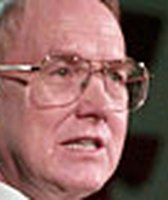Get PolitiFact in your inbox.
SUMMARY: Sen. Barack Obama used the flooding in the Midwest to say the wars in Iraq and Afghanistan have left the National Guard too depleted to be useful. He's right about the larger point, but his example of the floods is way off base.
When deadly flooding spread through the Midwest last month, thousands of America's "weekend warriors" served in their traditional role of responding to domestic crises.
But this latest natural disaster, which coincided with the start of hurricane season, raised a perennial question in post-Sept. 11 politics:
Now that the National Guard and Reserves are fighting two foreign wars, are they ready to respond to a major terrorist attack or catastrophic natural disaster?
Sen. Barack Obama ventured his answer at a news conference in Chicago last month. Asked about the national security credentials of his opponent, Republican Sen. John McCain, Obama said the war policy of McCain and President Bush has made the country less safe — not more.
"We are weakened financially and our military is strained to the breaking point as a consequence of our incursions into Iraq," Obama said. "Our National Guard, as we saw in the Midwest flooding, can't function as effectively as it could. I was talking to National Guard representatives. Fifteen of their 17 helicopters in this region were overseas during the flooding."
The National Guard refuted Obama's claim — with facts and figures — that combat responsibilities hampered its response to the flooding. Indeed, news reports make no mention of instances where the Guard didn't "function as effectively as it could."
Three states affected by the flooding said they had plenty of equipment and personnel to respond to the flooding. Only one — Missouri — had most if its helicopters committed overseas. And two of the three states said most of their deployed soldiers are in Kosovo, not Iraq or Afghanistan.
"We had what we needed to get the job done," said Lt. Col. Greg Hapgood, spokesman for the Iowa National Guard, which serves the state worst hit by the flooding. "If we needed more people we had more to call up."
It seems the Midwest flooding, which killed at least 24 people and destroyed as many as 5-million acres of crops, was a poor example for a broader point that has been well documented: The wars have made the Guard less ready to respond.
When asked to explain Obama's claim about problems with the Guard, his campaign said just that.
"The exact data point on helicopters that was relayed to Senator Obama was off, but the sentiment behind his statement was correct – that the Iraq war is overstretching our National Guard," Obama spokesman Tommy Vietor said in an e-mail.
Arnold Punaro, who led an independent congressional commission on the issue of Guard and Reserves readiness, said the gist of Obama's statement is true. Since 9/11, the Guard and Reserves have undergone a fundamental shift in mission, from a chiefly domestic force that might be deployed for once-in-a-lifetime conflicts overseas to a central part of America's combat capability.
Punaro's group concluded that there is an "appalling gap" in readiness to respond to catastrophes.
"They might be able to do it a little bit longer," said Punaro, a retired Marine major general. "At some point you stretch the rubber band and you break it."
The commission said reliance on the Guard and Reserves is the only choice if the United States is going to continue fighting wars with all-volunteer forces. It called for a sweeping overhaul of the structure and funding, which Punaro said Congress and the secretary of defense are working on.
So far, the conflicting burdens of the Reserve and Guard haven't led to a breakdown in disaster response. Mark Merritt, president of the crisis management firm James Lee Witt Associates, said that's because the National Guard always finds a way to do the mission.
"That's the military way," said Merritt, whose firm has advised Louisiana's recovery from Hurricane Katrina.
In 2004, for example, Florida suffered through four hurricanes in the same year that its National Guard deployment in Iraq was at an all-time high. But it still had thousands of troops to call upon and agreements with neighboring states to rely on. An entire brigade from Louisiana's Guard returned from a tour in Iraq just as Hurricane Katrina passed through. Instead of having time to recoup, they went straight into flood relief.
A significant number of National Guard soldiers and airmen are either deployed, just returned from deployment or preparing to go again. Merritt said that leaves a big unknown in the equation for disaster planning.
"That's a resource that's not there," Merritt said. "Not only is it not there in real time, but it's a real question mark as planning goes."
Our Sources
Interview, Iowa National Guard spokesman Lt. Col. Greg Hapgood, June 28
Interview, Tammy Spicer, captain in the public affairs office for the Missouri National Guard, June 26
Interview, Mike Chrisman, public affairs representative for the Illinois National Guard, June 26
Interview, Mark Merritt, president of James Lee Witt Associates, June 27
Interview, Lt. Col. Ron Tittle, director of public affairs for the Florida National Guard, July 1
Commission on the National Guard and Reserves, Final Report to Congress and the Secretary of Defense, Jan. 31, 2008
CNN.com Situation Room Transcripts, Obama's June 25 remarks
Washington Post, "'Appalling Gap' Found in Homeland Defense Readiness"

































